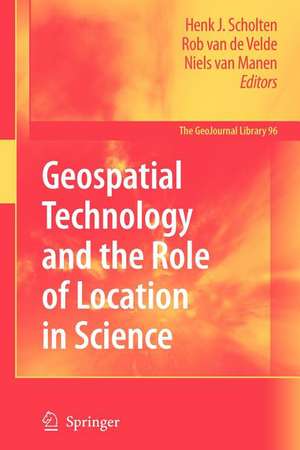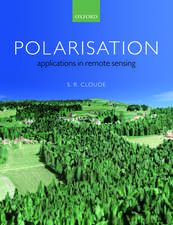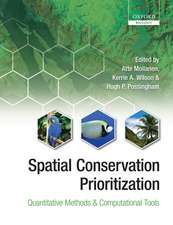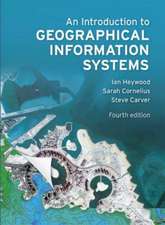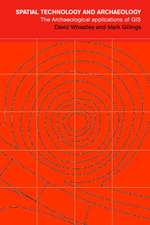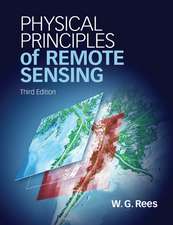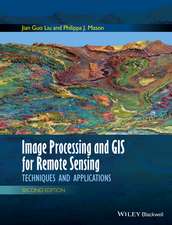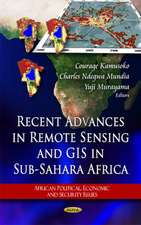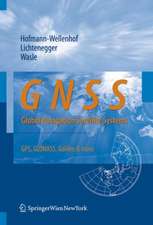Geospatial Technology and the Role of Location in Science: GeoJournal Library, cartea 96
Editat de Henk J. Scholten, Rob Velde, Niels van Manenen Limba Engleză Paperback – 29 noi 2011
This book offers the first systematic account of the science behind this mental and technological revolution. Tracing the adoption and dissemination of Geospatial Technology in a range of disciplines, it examines the impact this technology has had, and is likely to have, on the explanation of spatial behaviour, phenomena and processes. At the same time, stressing innovative usage, it explores scientific contributions to technology advancement.
| Toate formatele și edițiile | Preț | Express |
|---|---|---|
| Paperback (1) | 946.41 lei 6-8 săpt. | |
| SPRINGER NETHERLANDS – 29 noi 2011 | 946.41 lei 6-8 săpt. | |
| Hardback (1) | 952.40 lei 6-8 săpt. | |
| SPRINGER NETHERLANDS – 3 iul 2009 | 952.40 lei 6-8 săpt. |
Din seria GeoJournal Library
- 15%
 Preț: 642.51 lei
Preț: 642.51 lei - 15%
 Preț: 632.70 lei
Preț: 632.70 lei -
 Preț: 396.78 lei
Preț: 396.78 lei - 18%
 Preț: 948.92 lei
Preț: 948.92 lei -
 Preț: 430.59 lei
Preț: 430.59 lei - 18%
 Preț: 899.69 lei
Preț: 899.69 lei - 15%
 Preț: 581.79 lei
Preț: 581.79 lei - 18%
 Preț: 938.34 lei
Preț: 938.34 lei - 18%
 Preț: 888.80 lei
Preț: 888.80 lei - 15%
 Preț: 703.85 lei
Preț: 703.85 lei - 18%
 Preț: 890.68 lei
Preț: 890.68 lei - 24%
 Preț: 777.65 lei
Preț: 777.65 lei -
 Preț: 400.65 lei
Preț: 400.65 lei - 18%
 Preț: 785.55 lei
Preț: 785.55 lei - 18%
 Preț: 946.55 lei
Preț: 946.55 lei - 15%
 Preț: 661.02 lei
Preț: 661.02 lei - 18%
 Preț: 945.79 lei
Preț: 945.79 lei - 15%
 Preț: 637.28 lei
Preț: 637.28 lei - 15%
 Preț: 637.59 lei
Preț: 637.59 lei - 15%
 Preț: 637.46 lei
Preț: 637.46 lei - 15%
 Preț: 635.31 lei
Preț: 635.31 lei - 20%
 Preț: 568.44 lei
Preț: 568.44 lei - 15%
 Preț: 645.79 lei
Preț: 645.79 lei - 20%
 Preț: 569.86 lei
Preț: 569.86 lei - 15%
 Preț: 651.99 lei
Preț: 651.99 lei - 15%
 Preț: 639.41 lei
Preț: 639.41 lei - 15%
 Preț: 643.48 lei
Preț: 643.48 lei - 15%
 Preț: 663.60 lei
Preț: 663.60 lei - 15%
 Preț: 651.99 lei
Preț: 651.99 lei - 15%
 Preț: 651.02 lei
Preț: 651.02 lei -
 Preț: 390.63 lei
Preț: 390.63 lei -
 Preț: 395.63 lei
Preț: 395.63 lei
Preț: 946.41 lei
Preț vechi: 1154.16 lei
-18% Nou
Puncte Express: 1420
Preț estimativ în valută:
181.12€ • 188.39$ • 149.52£
181.12€ • 188.39$ • 149.52£
Carte tipărită la comandă
Livrare economică 14-28 aprilie
Preluare comenzi: 021 569.72.76
Specificații
ISBN-13: 9789400726031
ISBN-10: 9400726031
Pagini: 336
Ilustrații: XIII, 321 p.
Dimensiuni: 155 x 235 x 18 mm
Greutate: 0.47 kg
Ediția:2009
Editura: SPRINGER NETHERLANDS
Colecția Springer
Seria GeoJournal Library
Locul publicării:Dordrecht, Netherlands
ISBN-10: 9400726031
Pagini: 336
Ilustrații: XIII, 321 p.
Dimensiuni: 155 x 235 x 18 mm
Greutate: 0.47 kg
Ediția:2009
Editura: SPRINGER NETHERLANDS
Colecția Springer
Seria GeoJournal Library
Locul publicării:Dordrecht, Netherlands
Public țintă
ResearchCuprins
Geospatial Technology and the Role of Location in Science.- Location across Disciplines: Reflections on the CSISS Experience.- Location Awareness 2020: Addressing Auto-identification and Location in the 2020s.- Visualising Landscapes: Do Pictures Represent Theory or Data?.- Past in Place: The Role of Geo-ICT in Present-day Archaeology.- No Place in History – Geo-ICT and Historical Science.- Geo-ICT in Demography: The Impact of Developments in Geoinformation and Geotechnology on the Discipline of Demography.- The Adoption of Geo-ICT in Economics: Increasing Opportunities for Spatial Research in Economics.- Spatial Planning and Geo-ICT: How Spatial Planners Invented GIS and Are Still Learning How to Use It.- Geo-ICT: Connecting Physical and Virtual Geographies.- The Role of Place and Time in the Epidemiology of Tropical Diseases.- Real Crimes on Virtual Maps: The Application of Geography and GIS in Criminology.- Geo-ICT for Risk and Disaster Management.- Geo-ICT in Transportation Science.- Geographical Information Systems and Geography Teaching.- Synthesis: Geospatial Technology and the Role of Location in Science.
Recenzii
From the reviews:
“The editors of this volume aimed to obtain information about the present state of the use of geospatial technology or Geo-ICT … . this volume can be read with profit by industry professionals, businesses providing Geo-ICT technology, professors and teachers at several educational levels, organizations using Geo-ICT and perhaps even the public. … The greatest value of this volume will likely be for those who, like the editors, are seriously interested in the integration of Geo-ICT use across all disciplines … .” (Jack Dangermond, Applied Spatial Analysis and Policy, Vol. 4, 2011)
“The editors of this volume aimed to obtain information about the present state of the use of geospatial technology or Geo-ICT … . this volume can be read with profit by industry professionals, businesses providing Geo-ICT technology, professors and teachers at several educational levels, organizations using Geo-ICT and perhaps even the public. … The greatest value of this volume will likely be for those who, like the editors, are seriously interested in the integration of Geo-ICT use across all disciplines … .” (Jack Dangermond, Applied Spatial Analysis and Policy, Vol. 4, 2011)
Textul de pe ultima copertă
Globalisation has not led to the ‘death of geography’. Intensified relations between communities in different parts of the world have only highlighted the need for understanding and managing phenomena on a variety of geographic scales. From global warming to credit crunch, and from epidemics to terrorism, causes and solutions are sought on local, regional, national as well as inter-continental levels. With the advent of Geospatial Technology, scholars, policymakers and entrepreneurs have valuable tools in hand to proceed.
This book offers the first systematic account of the science behind this mental and technological revolution. Tracing the adoption and dissemination of Geospatial Technology in a range of disciplines, it examines the impact this technology has had, and is likely to have, on the explanation of spatial behaviour, phenomena and processes. At the same time, stressing innovative usage, it explores scientific contributions to technology advancement.
This book offers the first systematic account of the science behind this mental and technological revolution. Tracing the adoption and dissemination of Geospatial Technology in a range of disciplines, it examines the impact this technology has had, and is likely to have, on the explanation of spatial behaviour, phenomena and processes. At the same time, stressing innovative usage, it explores scientific contributions to technology advancement.
Caracteristici
Combines subject-specific contributions with essays aimed at synthesis Integrates evolutionistic and evolutionary models of technology integration Brings together the insights of internationally renowned Geospatial Technology scientists, educationalists and science-technology-society scholars
